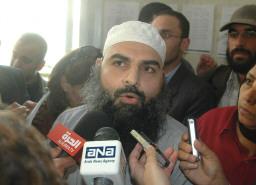A landmark Italian trial into one of the United States' most controversial anti-terrorism practices resumed on Wednesday when a judge ruled it could not wait for the settlement of a row between Milan prosecutors and the Italian government.
The trial has already been suspended twice pending a ruling on the so-called ''conflict of attribution'' between state powers over the 2003 CIA 'rendition' of Muslim cleric Hassan Mustafa Omar Nasr, also known as Abu Omar.
The Constitutional Court recently said it would start considering the arguments on July 8 - having originally been scheduled to discuss the issue at the end of January.
Wednesday's decision was taken by judge Oscar Magi who ruled that a further postponement would breach Italy's Constitutional requirement for a ''reasonable'' trial length.
Magia also said that negotiations between the prosecutors and the government towards a possible solution no longer made the top court's verdict critical.
After his ruling, Magi adjourned the trial until April 18 when he will consider a defendant's request to hold the trial behind closed doors. Nine Italians including former spy chief Niccolo' Pollari are on trial with 26 CIA agents for Nasr's abduction. The case has pitted the Milan prosecutors against the government.
The government contends the prosecutors overstepped their Constitutional bounds, needlessly exposing agents and straining US-Italian security ties.
The prosecutors say the government acted illegitimately in trying to cover up actions which subverted Italy's Constitution.
The Constitutional court was slated to examine the arguments on January 29 but postponed the hearing after the two sides said they would try to reach a mutual agreement.
Talks are still proceeding on the basis of prosecutors' willingness to substitute a highly sensitive document with another one containing basically the same information but with the most confidential parts blacked out.
But the need for a deal no longer hangs over the trial's fate.
A new factor which might affect the trial is which government emerges from April 13-14 elections.
The trial - the keenly awaited first judicial examination of rendition - opened in June but was adjourned two weeks later pending the Constitutional Court ruling.
Despite centre-left Premier Romano Prodi's government taking the same tack as that of Silvio Berlusconi - in power when the abduction took place - the case has caused tensions between Italy and the United States.
This was not helped by the trial opening hours before US President George W. Bush paid an official visit to Rome.
Last year the European Parliament (EP) rapped three countries including Italy for allowing the US to fly terror suspects to foreign locations where they are believed to have been tortured.
The Italian rapporteur in that EP inquiry, MEP Claudio Fava, has been pressing for the trial to proceed.
Last week he presented a petition from 300 people including European magistrates, Italian civil rights leaders and ordinary citizens accusing the government of obstructing justice.
''We demand that the arbitrary use of state secrecy be reversed,'' said the petition which was signed by well-known figures including historian Paul Ginsborg and Jewish cultural and rights activist Moni Ovadia.
The 300 claimed state secrecy ''has been brandished too many times by too many governments with the sole aim of depriving this country of its right to the truth''.
The 26 CIA agents, including ex-Rome chief Robert Seldon Lady and ex-Milan chief Jeff Castelli, were put on trial in absentia.
The former commander and deputy commander of Italian military intelligence agency SISMI, Niccolo' Pollari and Marco Mancini, are also on trial along with five SISMI agents.
NASR CASE 'PERFECT EXAMPLE OF RENDITION'.
Nasr, the former head of Milan's main mosque, disappeared from the northern city on February 17, 2003.
Prosecutors say he was snatched by a team of CIA operatives with SISMI's help and whisked off to a NATO base in Ramstein, Germany, on board a Gulfstream jet belonging to the Boston Red Sox baseball team.
From there, he was taken to Egypt to be interrogated under duress.
Nasr, who was under investigation in Italy on suspicion of helping terrorists, was released early last year from an Egyptian jail where he says he was tortured and threatened with rape.
He has demanded millions of euros in compensation from the Italian government.
The prosecution has called more than 100 witnesses including Berlusconi and Prodi.
It also called Dick Marty, head of a Council of Europe (CE) probe which concluded that 100 persons had been kidnapped by the CIA in Europe and rendered to a country where they might be tortured.
Marty has described Nasr's abduction as a ''perfect example of extraordinary rendition''.
The report from Europe's top human rights body claims the US made a secret deal with NATO in October 2001 to permit the CIA flights and also supply aid to countries threatened by terrorism.
The CE claims the CIA ran secret prisons in Poland and Romania from 2002 to 2005 with the knowledge of the two countries' presidents.
Prosecutors in several other European countries are now probing CIA flights.
The US admits renditions but denies torture - although the legal status of admitted techniques such as waterboarding is controversial.
The US State Department described the EP report as ''unfair, inaccurate and distorted''.
The CIA was first granted permission to use rendition in a presidential directive signed by President Bill Clinton in 1995 and the practice grew sharply after the September 11 terrorist attacks.
The US recently said it had suspended its rendition programme but news media have claimed it has been farmed out to other countries, especially in the Horn of Africa.













